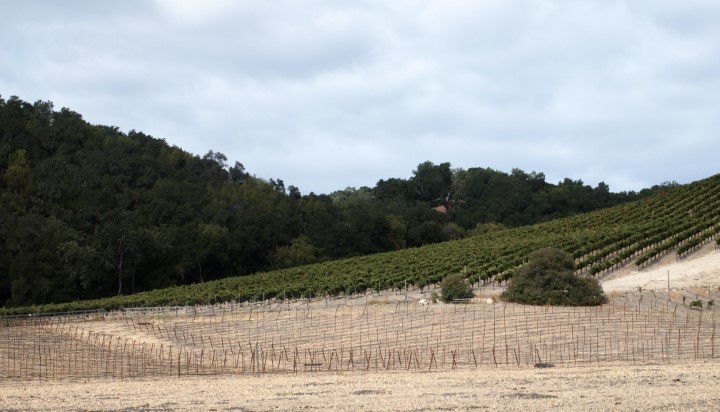Managing Climate Risk in Paso Robles, California - American Viticultural Area
Max Pepperdine, fourth-year environmental management and protection major

Modifying row orientation to protect vines from the afternoon sun is an important redevelopment decision that can make vineyards more resilient to projected increases in average temperatures and extreme heat events.
Photo: Nicholas Babin.
Agriculture in general – and wine grape growing in particular – are experiencing the impacts of climate change, which is necessitating new ways of doing business. That was the catalyst for Nicholas Babin, assistant professor in the Natural Resources Management and Environmental Sciences (NRES) Department and a team of students to publish a study on how wine grape growers in the Paso Robles American Viticultural Area (AVA) can manage crop production risks associated with climate change.
California’s wine grape growers face a range of challenges as climate change intensifies, including extreme heat events, rising temperatures and extended periods of drought.
While all agricultural sectors are at risk due to climate change, wine grape growers are particularly vulnerable because of the long life span of vineyards. Babin and a group of Cal Poly graduate students recently developed a vineyard-specific climate projection tool for the Paso Robles AVA that will help growers manage climate risk and plan adaptation strategies.
Vineyard redevelopment in the Paso Robles AVA.
As vineyards are planted new or redeveloped, long-term
adaptations can be introduced, such as changing grape
variety, rootstock, vine spacing, row orientation and
trellising systems. Photo: Nicholas Babin.
“The production span for wine grapes is 20 to 50 years, so it’s vital that vineyard managers and advisors plan, design and implement adaptation strategies that account for future climatic changes,” Babin said. The effectiveness of these vineyard management strategies will likely benefit from climate change decision support systems (CCDSS) that provide climate projections for agriculture.
Babin and his team helped develop a method for transforming downscaled climate information from Cal-Adapt into vineyard-level climate projection scenarios for vineyard managers and advisors in the Paso Robles AVA.
“These types of projections can be used to prompt growers and advisors to consider a variety of strategies for managing future climate risk and planning adaptation, including strategies such as row orientation, variety selection, dry farming, crop diversification and relocation,” Babin said.
Babin and the graduate students shared these vineyard-specific projections in a series of interviews and surveys with more than 100 local vineyard managers and advisors who not only saw the practicality of the projections but also found them helpful in bridging their psychological distance from climate change.
Agricultural climatic scenarios similar to the one developed by Babin and his colleagues may prove especially useful for integrating climate change into the future planning and redevelopment decisions that vineyard managers will face in the near future.
This approach could be extended and used by managers of other California perennial crops that may also be vulnerable to climate change.
Find the full research article by Babin here: Vineyard-specific climate projections help growers manage risk and plan adaptation in the Paso Robles AVA
Read more stories in the Summer 2022 Newsletter




 Open: M - F 8am - 5pm
Open: M - F 8am - 5pm